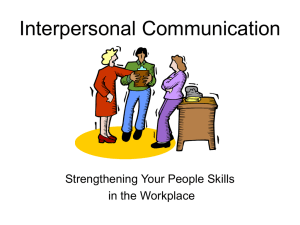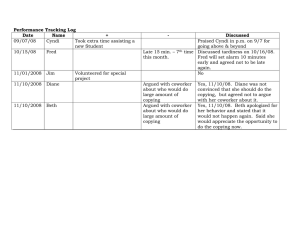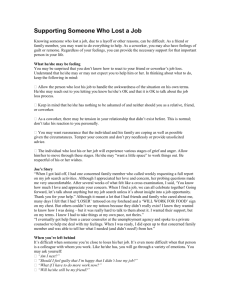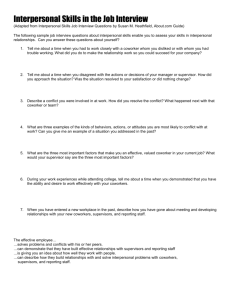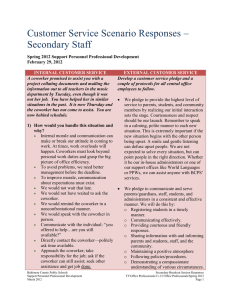Customer Service Scenario Responses
advertisement
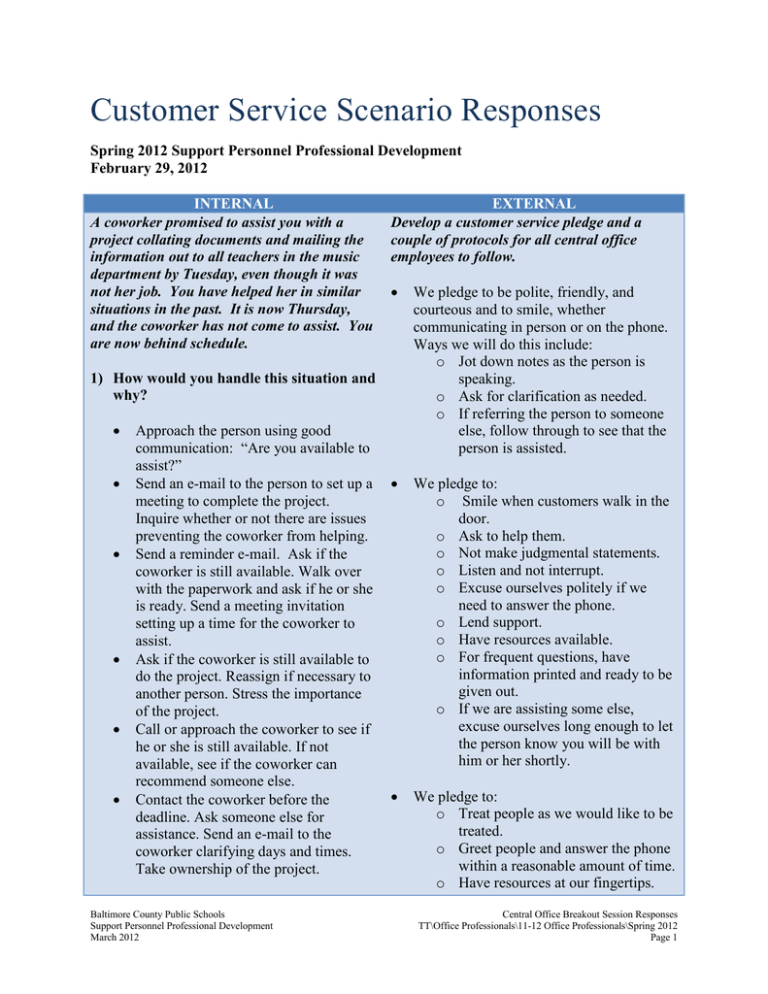
Customer Service Scenario Responses Spring 2012 Support Personnel Professional Development February 29, 2012 INTERNAL A coworker promised to assist you with a project collating documents and mailing the information out to all teachers in the music department by Tuesday, even though it was not her job. You have helped her in similar situations in the past. It is now Thursday, and the coworker has not come to assist. You are now behind schedule. EXTERNAL Develop a customer service pledge and a couple of protocols for all central office employees to follow. We pledge to be polite, friendly, and courteous and to smile, whether communicating in person or on the phone. Ways we will do this include: o Jot down notes as the person is speaking. o Ask for clarification as needed. o If referring the person to someone else, follow through to see that the person is assisted. We pledge to: o Smile when customers walk in the door. o Ask to help them. o Not make judgmental statements. o Listen and not interrupt. o Excuse ourselves politely if we need to answer the phone. o Lend support. o Have resources available. o For frequent questions, have information printed and ready to be given out. o If we are assisting some else, excuse ourselves long enough to let the person know you will be with him or her shortly. We pledge to: o Treat people as we would like to be treated. o Greet people and answer the phone within a reasonable amount of time. o Have resources at our fingertips. 1) How would you handle this situation and why? Approach the person using good communication: “Are you available to assist?” Send an e-mail to the person to set up a meeting to complete the project. Inquire whether or not there are issues preventing the coworker from helping. Send a reminder e-mail. Ask if the coworker is still available. Walk over with the paperwork and ask if he or she is ready. Send a meeting invitation setting up a time for the coworker to assist. Ask if the coworker is still available to do the project. Reassign if necessary to another person. Stress the importance of the project. Call or approach the coworker to see if he or she is still available. If not available, see if the coworker can recommend someone else. Contact the coworker before the deadline. Ask someone else for assistance. Send an e-mail to the coworker clarifying days and times. Take ownership of the project. Baltimore County Public Schools Support Personnel Professional Development March 2012 Central Office Breakout Session Responses TT\Office Professionals\11-12 Office Professionals\Spring 2012 Page 1 o Take notes about a call and repeat to the caller what we thought we heard. o Listen intently. o Be polite and understanding. o Be helpful, eager, and empathetic. o Help customers find solutions to their problems. o Greet with a smile. o Validate the customer’s concern. o Direct customers to the right person/office/school. 2) Would you report the situation to your supervisor? Why or why not? If the coworker is unavailable, go to the supervisor to advise him or her of a possible delay. No, it was not the other person’s job. Yes, to make the supervisor aware of the delay and to ask for additional assistance. No. It is not in the coworker’s scope of work. If the task can’t be done in time, report to the supervisor. Seek help elsewhere. Get solutions to the problem: ask another coworker. No, not unless you need additional help to complete the project or additional time. No, since the assignment was mine. Always have a back-up (Plan B). 3) What effect might her behavior have on your relationship? Why? We pledge to courteously greet customers on the phone or in person. We will do this by giving the office name and our name. We will listen and repeat the person’s concern, making sure his or her objectives are met. We will make the person feel welcome with our greeting and send him or her to the correct location if we are not able to help. We pledge to provide the highest level of customer service to each individual. We will do this by: o Providing good listening skills. o Addressing the person’s needs. o Finding a resolution to the customer’s needs. If the coworker helps, all is well. If he or she refuses without a good reason, the relationship will be strained. Depending on why the coworker couldn’t help, we would change the approach of future requests for help and may not rely on this coworker in the future. You would lose confidence in that person. Tell the colleague you appreciate the offer to assist even if he or she was unable to assist. o We wouldn’t have waited until Thursday. o We would remain on good terms. In the future, get a commitment up front before the project is assigned. No effect, unless the coworker is not a team player—if he or she is consistently “not available.” Learn from the mistake the need for Baltimore County Public Schools Support Personnel Professional Development March 2012 We pledge to greet each customer courteously with a smile and positive tone. We will listen attentively and offer assistance. We will treat customers as we would want to be treated. We will follow through on requests. We will validate concerns. We will use the following protocol: Strive to defuse/de-escalate situations. Central Office Breakout Session Responses TT\Office Professionals\11-12 Office Professionals\Spring 2012 Page 2 better communication. The mistake is not necessarily negative. It may indicate a need for better project management on my part. Baltimore County Public Schools Support Personnel Professional Development March 2012 Central Office Breakout Session Responses TT\Office Professionals\11-12 Office Professionals\Spring 2012 Page 3 Spring 2012 Support Personnel Professional Development March 8, 2012 INTERNAL A coworker promised to assist you with a project collating documents and mailing the information out to all teachers in the music department by Tuesday, even though it was not her job. You have helped her in similar situations in the past. It is now Thursday, and the coworker has not come to assist. You are now behind schedule. EXTERNAL Develop a customer service pledge and a couple of protocols for all central office employees to follow. We pledge to: o Treat the customer with respect, acknowledge the customer’s objective and concerns. o Be part of the customer’s solution, not the problem. o Be willing to listen. o Provide detailed information and guidance. o Follow up with the customer when necessary. o Greet the customer with a positive attitude. o Identify ourselves and office. o Write down information. We pledge to promptly provide efficient customer service by identifying ourselves to the customers and listening to their concerns with patience and understanding. Protocols we will use to do this are: o Timely follow-up if necessary. o Providing additional contact information if necessary. o Saying “thank you” for inquiring. o Showing respect. o Listening. o Showing concern/empathy. o Giving undivided attention. o Being positive. o Being patient. We pledge to greet all with courtesy and professionalism by: o Identifying ourselves and our office and by asking how we can be of service. o By listening patiently without 1) How would you handle this situation and why? Confirm with the coworker by Tuesday to see if he or she is going to assist with the project. Confront the person to give a friendly reminder that he or she agreed to assist. Make other plans to get the task completed. Ask the coworker if he or she is available or if I should ask another coworker. Check with the coworker before Thursday. Have a back-up plan. Communicate with the coworker. Reapproach, reevaluate, ask someone else to help with the task. Ask the coworker if he or she can assist and when will he or she will be available. We would not wait until Thursday to contact the coworker. We would use humor in addressing the coworker. We would take ownership of the project. 2) Would you report the situation to your supervisor? Why or why not? Do not report the situation to the supervisor unless it will negatively Baltimore County Public Schools Support Personnel Professional Development March 2012 Central Office Breakout Session Responses TT\Office Professionals\11-12 Office Professionals\Spring 2012 Page 4 impact other task timelines. Let the supervisor know that you are behind schedule but have asked for assistance. No, because it was not the coworker’s responsibility. No, because the coworker was not assigned to the job. Report the situation, not the person. If the coworker is not available, ask the supervisor if there is someone else who can assist. No, unless the situation is repeated. interrupting, and providing appropriate customer service. o By making eye contact, speaking in a pleasant tone of voice, and smiling. We pledge to be courteous, pleasant, helpful, informative, resourceful, and compassionate to all customers. We will accomplish this by listening. We pledge to: o Greet everyone with a smile and in a professional and courteous manner. o Listen to customer concerns while maintaining eye contact. o Assist customers if we can or direct them to someone who can assist. o Empathize with their concerns. o Keep the conversation positive. o Treat customers the way we would want to be treated. We pledge to: o Isolate the issue; if necessary, get the person’s name and phone number and call him or her back. o Repeat what the caller is saying. o Be truthful. o Respond in a timely manner. o Show sincerity and respect. o Listen. 3) What effect might her behavior have on your relationship? Why? Ask for assistance differently. It would not affect the relationship. None—it could be a flag depending on the excuse. Probably would not ask her for assistance again. May be unreliable because of the lack of communication skills. It wouldn’t affect the relationship. If the person could not help because of his or her own workload, it would not affect the relationship. If the person could not help because he or she did not want to, it would put a strain on the relationship because it would create mistrust for future projects. If repeated, it might affect the relationship. Baltimore County Public Schools Support Personnel Professional Development March 2012 Central Office Breakout Session Responses TT\Office Professionals\11-12 Office Professionals\Spring 2012 Page 5

